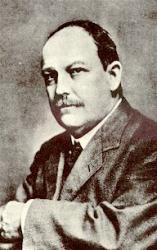
1738 - 1799 Hymnal Number: 244 Author of "Loving Kindness" in The World Evangel Medley, Samuel, born June 23, 1738, at Cheshunt, Herts, where his father kept a school. He received a good education; but not liking the business to which he was apprenticed, he entered the Royal Navy. Having been severely wounded in a battle with the French fleet off Port Lagos, in 1759, he was obliged to retire from active service. A sermon by Dr. Watts, read to him about this time, led to his conversion. He joined the Baptist Church in Eagle Street, London, then under the care of Dr. Gifford, and shortly afterwards opened a school, which for several years he conducted with great success. Having begun to preach, he received, in 1767, a call to become pastor of the Baptist church at Watford. Thence, in 1772, he removed to Byrom Street, Liverpool, where he gathered a large congregation, and for 27 years was remarkably popular and useful. After a long and painful illness he died July 17, 1799. Most of Medley's hymns were first printed on leaflets or in magazines (the Gospel Magazine being one). They appeared in book form as:—
(1) Hymns, &c. Bradford, 1785. This contains 42 hymns. (2) Hymns on Select Portions of Scripture by the Rev. Mr. Medley. 2nd ed. Bristol. W. Pine. 1785. This contains 34 hymns, and differs much from the Bradford edition both in the text and in the order of the hymns. (3) An enlargement of the same in 1787. (4) A small collection of new Hymns, London, 1794. This contains 23 hymns. (5) Hymns. The Public Worship and Private Devotion of True Christians Assisted in some thoughts in Verse; principally drawn from Select Passages of the Word of God. By Samuel Medley. London. Printed for J. Johnson. 1800. A few of his hymns are also found in a Collection for the use of All Denominations, published in London in 1782.
Medley's hymns have been very popular in his own denomination, particularly among the more Calvinistic churches. In Denham's Selections there are 48, and in J. Stevens's Selections, 30. Their charm consists less in their poetry than in the warmth and occasional pathos with which they give expression to Christian experience. In most of them also there is a refrain in the last line of each verse which is often effective. Those in common use include:—
1. Come, join ye saints, with heart and voice. (1800). Complete in Christ.
2. Death is no more among our foes. Easter.
3. Eternal Sovereign Lord of all. (1789). Praise for Providential Care.
4. Far, far beyond these lower skies. (1789). Jesus, the Forerunner.
5. Father of mercies, God of love, whose kind, &c. (1789.) New Year.
6. Great God, today Thy grace impart. Sermon.
7. Hear, gracious God! a sinner's cry. (1789). Lent.
8. In heaven the rapturous song began. Christmas.
9. Jesus, engrave it on my heart. (1789). Jesus, Needful to all.
10. Mortals, awake, with angels join. (1782). Christmas.
11. My soul, arise in joyful lays. (1789). Joy in God.
12. Now, in a song of grateful praise. Praise to Jesus. In the Gospel Magazine, June, 1776.
13. O could I speak the matchless worth. (1789.) Praise of Jesus.
14. O for a bright celestial ray. Lent.
15. O God, Thy mercy, vast and free. (1800). Dedication of Self to God.
16. O let us tell the matchless love. Praise to Jesus.
17. O what amazing words of grace. (1789). Foutain of Living Waters.
18. Saints die, and we should gently weep. (1800). Death and Burial. From his "Dearest of Names, Our Lord and King."
19. See a poor sinner, dearest Lord. Lent.
20. Sing the dear Saviour's glorious fame. (1789). Jesus the Breaker of bonds.
In 1800 a Memoir of Medley was published by his son, which is regarded by members of the family now living as authoritative. But in 1833 appeared another Memoir by Medley's daughter Sarah, to which are appended 52 hymns for use on Sacramental occasions. These she gives as her father's. But 8 of them are undoubtedly by Thos. Kelly, published by him in 1815, and reprinted in subsequent editions of his Hymns. The remainder are by Medley. Nearly all of these 52 hymns (both Medley's and Kelly's) have been altered in order to adapt them to Sacramental use. In Sarah Medley's volume, Kelly's hymns all follow one another, and three of them are in a metre which Medley apparently never used. What could have been Sarah Medley's motive in all this it is hard to divine. She is said to have been a clever, though unamiable woman, and was herself the author of a small volume of Poems published in 1807. In the Memoir she does not conceal her hatred of her brother. [Rev. W. R. Stevenson, M.A.]
-- John Julian, Dictionary of Hymnology (1907)
Samuel Medley


 My Starred Hymns
My Starred Hymns







